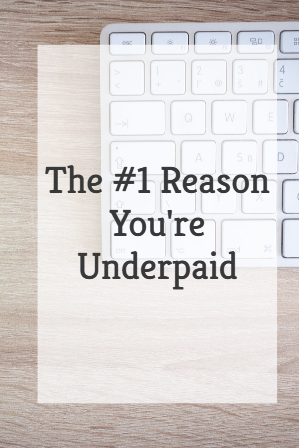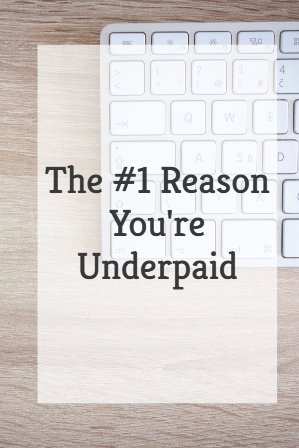A few years ago I worked with a client who was earning just enough money to pay the bills, and not much else. She was tired of living paycheck-to-paycheck, just getting by, and she came to me for advice.
She thought getting a bachelor’s degree in her field would help her earn a higher salary, but the lack of a degree in her field was not the reason she was underpaid.
Instead of spending thousands of dollars and 4-6 years taking classes for a degree, we worked together for 3 months and she got a $10,000 annual raise. That’s an extra $833 per month!

As a career coach, I’ve seen it time and again- the #1 reason most people are underpaid, whether you work for someone else or work for yourself, is because you aren’t owning your value.
In day-to-day interactions with colleagues and clients, you aren’t taking credit for your work. You minimize your value. In an attempt to appear polite, or humble, friendly, or a team player, you aren’t owning your worth. This happens most often when you’re unable to accept recognition.
Women, in particular, have a bad habit of deflecting compliments and praise. This plays out like a game of dodgeball- you see the compliment coming and at the last second you dodge to avoid being hit. Whew, good job not getting any praise on you!
Thanks, but
Compliment dodgeball happens when you’re praised for your work and you downplay your contribution, aka the “Thanks, but”.
“Thanks, but I wasn’t happy with the font I used.”
“Thanks, but I barely finished on time.”
“Thanks, but it was not my best work.”
“Thanks, but it was a team effort.”
Don’t be a “but”-head. Here’s how to respond instead:
“Thanks, I am proud of my contribution to this project.”
“Thank you. Would you mind passing that feedback on to my boss?” or “Thank you. Would you mind providing a testimonial?”
“Thank you.” (End-stop.)
I’m actually, really qualified
Another form of compliment dodgeball happens when compliments are justified to prove you really deserve the credit, aka the “I’m actually, really qualified!”
“Thank you! My master’s degree finally paid off!”
“Thank you! I worked all weekend to get it done!”
Instead of justifying praise, try accepting it. “Thank you” is all you really need to say.
I’m rubber, you’re glue.
Let’s not stop there! Yet another form of compliment dodgeball happens when you barely register praise before giving it right back, aka “I’m rubber, you’re glue.”
“Oh, thank you! And you did such a great job leading that meeting last week.”
“Thank you! And thank you for the yummy cookies you brought in yesterday.”
“Thanks! And you’re such a great person. You have great hair.”
Sure, it’s nice and polite to return a compliment with a compliment. It’s also a great way to avoid letting the original compliment sink in.
Want to be proficient in compliment acceptance? Do try this at home!
Now if you want to go advanced ninja skills with accepting compliments, try this. Find a friend, or a group of friends, and practice receiving compliments. Here’s how- make an agreement that whenever you are complimented by your friend, you reply, “Thank you, I know!”
Saying, “I know,” in response to a compliment will be difficult because you are not taught to admit you’re actually amazing. In fact, most of us were told that knowing we’re good at something is actually bad- it’s arrogant, it’s vain, it’s conceited.
But here’s the thing- it’s not bad to know what you’re good at. I’ll go ahead and say it’s good. It’s how you are hired for amazing opportunities, it’s how you become well-paid, it’s how you build trust and credibility. And it’s how you build confidence!
Stop minimizing, justifying, and deflecting compliments and praise!
This habit of compliment dodgeball is just one of the things I worked on with my client that got the $10,000 annual raise.
Most people know they need to work on communication skills in important conversations like job interviews, raise negotiations, and sales conversations. What most people don’t know is your day-to-day communication skills, and your ability to own your worth, has a bigger impact on your income level!
If you act like your skills aren’t that valuable 90% of the time, and only talk up your strengths 10% of the time, what do you think people will believe about you? What will you believe about yourself?
If you’re they quietly ambitious type who does all the work and accepts little of the credit; if you’re unfulfilled, underpaid, or unhappy with your career or business, let’s chat! What would you do with an extra $10,000 this year?

